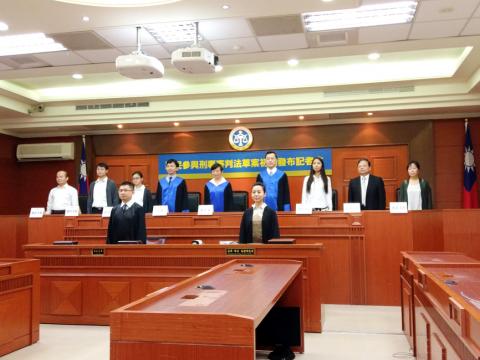The Judicial Yuan yesterday completed the first draft for a bill authorizing the public’s participation in criminal trials as so-called “citizen judges,” which received a mixed welcome from the nation’s legal professionals and judicial reform groups.
The bill, which contains 120 articles, establishes the rights and responsibilities of citizen judges on panels in criminal trials that would include professional judges.
Panels of three professional and six citizen judges would rule on criminal trials, ranging from offenses carrying a prison sentence of at least seven years to “homicide occurring in the intentional commission of a crime.”

Photo: Hsiang Cheng-chen, Taipei Times
The citizen judges would be selected at random, but they would have to be Republic of China citizens and at least 23 years old, among other qualifications.
People called to serve on the panels would receive a daily stipend and reimbursement for transportation and other expenses.
They would be forbidden from disclosing court information to the public until they have rendered a verdict or from asking for or receiving bribes in connection to their duties, or risk a prison term of less than 10 year.
The panels would require a two-thirds majority to render a guilty verdict. Should less than two-thirds agree on a guilty verdict, the panel would be required to either uphold the assumption of innocence or render a verdict in favor of the defendant.
Opening the halls of justice to the public would help educate people about the law and help the judicial system identify its shortcomings, one prosecutor said on condition of anonymity.
However, the random selection of citizen judges might result in the drafting of “rank amateurs,” a prosecutor said, adding that walking a panel through basic legal principles might add to prosecutors’ workloads.
Criminal trials could become more time-consuming, creating stress for defendants in pretrial detention and professional judges, the prosecutor said.
The bill should be seen as the Judicial Yuan’s response to the resolution of the National Congress on Judicial Reform, said lawyer Huang Di-ying (黃帝穎), deputy director of legal reform group Taiwan Forever Association.
“The bill’s conception of citizen judges is more progressive than the current judicial system, in which power is monopolized by judges, but the proposal still has room for improvement,” Huang said.
The bill would create a system that is closer to the Japanese system of lay judges than the common law system of “trial by jury” in the UK or the US, he said.
A jury system maintains a separation of powers, with jurors determining issues of fact and a judge ruling on issues of law, which is dissimilar to the Judicial Yuan’s mixed panel of citizen and professional judges, he added.
The congress voted itself into a deadlock when it tried to choose between the two systems, Huang said.
Additional reporting by Chen Wei-han

SECURITY: As China is ‘reshaping’ Hong Kong’s population, Taiwan must raise the eligibility threshold for applications from Hong Kongers, Chiu Chui-cheng said When Hong Kong and Macau citizens apply for residency in Taiwan, it would be under a new category that includes a “national security observation period,” Mainland Affairs Council (MAC) Minister Chiu Chui-cheng (邱垂正) said yesterday. President William Lai (賴清德) on March 13 announced 17 strategies to counter China’s aggression toward Taiwan, including incorporating national security considerations into the review process for residency applications from Hong Kong and Macau citizens. The situation in Hong Kong is constantly changing, Chiu said to media yesterday on the sidelines of the Taipei Technology Run hosted by the Taipei Neihu Technology Park Development Association. With

CARROT AND STICK: While unrelenting in its military threats, China attracted nearly 40,000 Taiwanese to over 400 business events last year Nearly 40,000 Taiwanese last year joined industry events in China, such as conferences and trade fairs, supported by the Chinese government, a study showed yesterday, as Beijing ramps up a charm offensive toward Taipei alongside military pressure. China has long taken a carrot-and-stick approach to Taiwan, threatening it with the prospect of military action while reaching out to those it believes are amenable to Beijing’s point of view. Taiwanese security officials are wary of what they see as Beijing’s influence campaigns to sway public opinion after Taipei and Beijing gradually resumed travel links halted by the COVID-19 pandemic, but the scale of

A US Marine Corps regiment equipped with Naval Strike Missiles (NSM) is set to participate in the upcoming Balikatan 25 exercise in the Luzon Strait, marking the system’s first-ever deployment in the Philippines. US and Philippine officials have separately confirmed that the Navy Marine Expeditionary Ship Interdiction System (NMESIS) — the mobile launch platform for the Naval Strike Missile — would take part in the joint exercise. The missiles are being deployed to “a strategic first island chain chokepoint” in the waters between Taiwan proper and the Philippines, US-based Naval News reported. “The Luzon Strait and Bashi Channel represent a critical access

Pope Francis is be laid to rest on Saturday after lying in state for three days in St Peter’s Basilica, where the faithful are expected to flock to pay their respects to history’s first Latin American pontiff. The cardinals met yesterday in the Vatican’s synod hall to chart the next steps before a conclave begins to choose Francis’ successor, as condolences poured in from around the world. According to current norms, the conclave must begin between May 5 and 10. The cardinals set the funeral for Saturday at 10am in St Peter’s Square, to be celebrated by the dean of the College